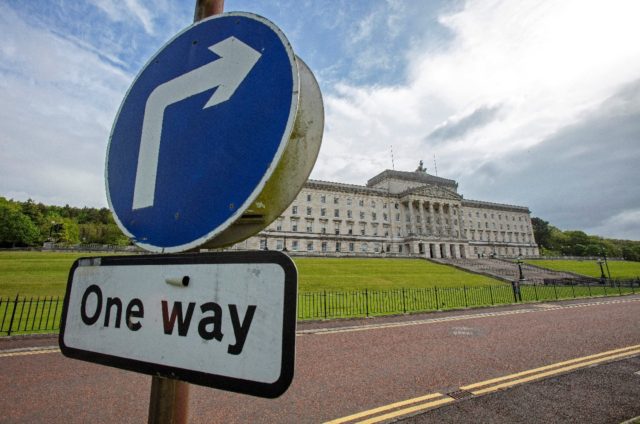Prime Minister Boris Johnson faces a tongue-lashing in Belfast next week after pro-UK unionists on Friday vetoed the start of a new, nationalist-led legislative assembly.
In a historic development, the role of Northern Ireland’s first minister is set to be taken by the pro-Irish party Sinn Fein, after it triumphed in elections to the Stormont assembly last week.
But the pro-UK Democratic Unionist Party (DUP), angered at the “Northern Ireland Protocol” agreed as part of Britain’s Brexit deal with the European Union, blocked the election of a speaker at Stormont.
The DUP’s former first minister in the power-sharing executive between unionists and nationalists, Paul Givan, said his party was “determined to succeed” in removing the protocol.
Sinn Fein’s Northern Ireland leader Michelle O’Neill accused the DUP of holding the British-ruled territory to “ransom”.
“I’ve spoken with Boris Johnson himself. He will be here on Monday. I intend to put it to him directly that he needs to stop pandering to the DUP,” she told reporters.
The UK government was “playing a game of chicken with the (European) commission right now, and we’re caught in the middle”, the first minister-elect added.
There was no immediate comment from Downing Street, after reports said Johnson’s government was poised next week to suspend the EU protocol or legislate to eliminate its requirements from UK law.
The protocol mandates checks on goods coming to the province from mainland Great Britain, to ensure no return of a physical border between Northern Ireland and EU member Ireland to the south.
The elimination of the hard border was a key strand of the 1998 Good Friday Agreement, which ended three decades of sectarian violence in Northern Ireland.
US concern
Johnson’s visit is expected to coincide with a delegation from the US Congress. The United States was a guarantor of the Good Friday Agreement, and has expressed alarm at the UK’s attacks on the protocol.
“If Britain wants to see a trade war (with the EU) or wants a future trade deal with the American administration, then they need to honour the Good Friday Agreement and stop messing with it because, quite frankly, that’s what they’re doing right now,” O’Neill said.
However, both the DUP and Johnson’s government insist the protocol itself is threatening the peace, by casting pro-British unionists adrift from the mainland UK.
The situation has become “very serious” and the EU must show more flexibility, Johnson’s spokesman told reporters earlier Friday, even as Brussels insists there can be no renegotiation.
Givan, who withdrew as first minister in February and collapsed the last executive, said the protocol had installed a de-facto border in the Irish Sea and “fundamentally undermined” the 1998 peace pact.
“It has changed our relationship with the United Kingdom and not one unionist elected to this assembly supports the Northern Ireland Protocol,” he said.
The DUP fears the post-Brexit arrangement has made the return of a united Ireland more likely — fears that have only worsened with Sinn Fein’s victory last Thursday.
EU warning
Newly elected and returning members of the legislative assembly (MLAs) in Belfast officially registered themselves at the first sitting since the election.
In its election campaign, the DUP said it would boycott the assembly until the protocol is replaced.
The non-aligned Alliance Party leader Naomi Long characterised the DUP’s position as a “slap in the face” of struggling families.
O’Neill stressed that without a functioning executive, Northern Ireland’s people would be deprived of vital funds as all of the UK is grappling with a cost-of-living crisis.
Johnson’s former Brexit negotiator David Frost defended the government’s position, saying it had “no option now other than to act unilaterally to disapply part or all of” the protocol.
“There is an imminent threat to our ability to govern Northern Ireland,” Frost wrote in the Daily Telegraph, saying that possible EU retaliation on trade tariffs would be “disproportionate”.
But Europe’s chief negotiator on the issue, Maros Sefcovic, on Thursday said unilateral action by London to suspend the protocol “is simply not acceptable”.
“Upholding the rule of law and living up to international obligations is a necessity,” he said, while other EU leaders have bemoaned the disunity as a gift to Russia as the West rallies behind Ukraine.

COMMENTS
Please let us know if you're having issues with commenting.